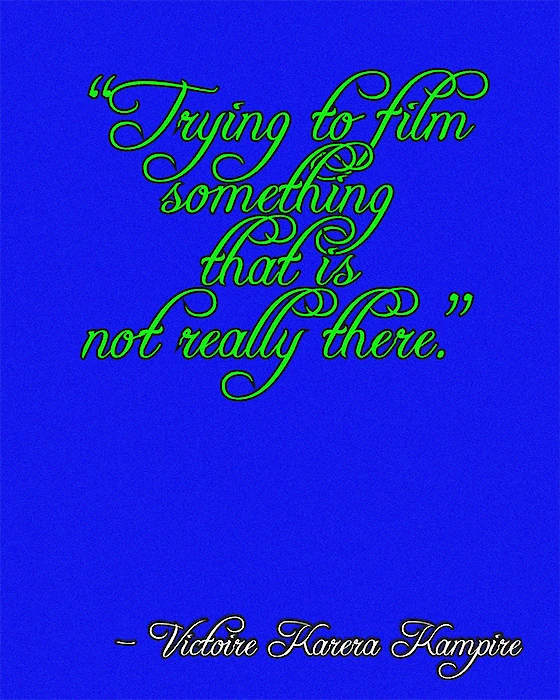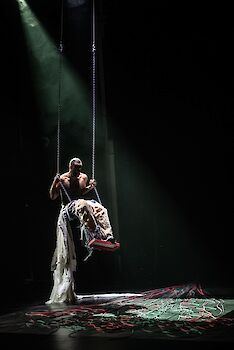Victoire Karera Kampire is a Brussels-based filmmaker and one of Beursschouwburg's associate artists from 2024 to 2026. Our film programmer Quinten Wyns talked to Victoire about her own Beursschouw-past, about her artistic practice today, and about her first event here in the very near future.
... so much of this collective work is done in ongoing conversations…
QW: We’re really happy to welcome you as one of the new associated artists at Beursschouwburg. Before ending up here as an artist, what was your relationship to Beurs, as a place, as a house? Do you have good memories here, watching a film or a performance for the first time?
VKK: I have loads of memories at Beurs, actually. Maybe not the type that you might think of, not related to film or cinema. I have loads of memories on the dance floor of Beursschouwburg. For me, prior to this new adventure, it was always a place for nightlife music. That's kind of my background, too. I used to work in music, so I would come to Beursschouwburg often, for shows mainly. I really only started coming for films when I was in film school, which isn't that long ago. But I find it really interesting how, with a place like Beursschouwburg, that is really multidisciplinary, you can be so focused on this one particular aspect of it and then years later it all of a sudden opens up again in a completely new light, because you also start exploring its other events. So Beurs really opened up for me as time went by. But the first thing that comes to mind is definitely dancing a lot.
… shout out to Christina for sure …
QW: Is there a particular show you remember that stayed with you?
VKK: I remember a lot of shows. I remember Fatima's show. She's this singer from London. That was a really good one. I remember one from this guy. I forgot his name, but he came to the show masked the whole time, so we weren't even sure he was really there. And I think that's something he does more often. Nobody ever knows if he's really there performing or not. Yeah, it was a really weird show, but I can't remember the name now.
QW: I once was at a show of Dean Blunt at Beurs where we thought he wasn’t really there at all.
VKK: Yes, Dean Blunt, that's him! I was at that show as well! Yeah, he stayed behind this screen the whole time, never showing his face. So, yeah, that's a show I remember really well, funnily enough, because of his absence.
And parties. Especially during summertime. I mean, you have the best rooftop you can find in town. And I also really, really like Christina, who’s in charge of the bathrooms. Christina is a familiar face. Shout out to Christina for sure. She’s always super nice with people and warm and welcoming.
… so Beurs really opened up for me as time went by. But the first thing that comes to mind is definitely dancing a lot …
QW: Your past is in music. How would you describe your current practice as an artist? Where would you position yourself in the arts?
VKK: As a filmmaker. That seems like the easy answer, but I use moving images as the main media in my work, currently, and I work with sound a lot, too, which definitely somehow goes back to my background in music. Not that I was making music, but because of my job at the time I was listening to a lot of music, I went to a lot of shows. I guess if I was talented enough, I'd have been a musician. I think music or sound specifically allowed me to perceive images differently. I was always a “cinema fan”. I love films and what they can convey and the emotion that comes with it and how powerful they can be, even to an extent that it can be dangerous. But yeah, I'd say I’m a filmmaker because that's what my focus is on right now. But this, too, could open up in time.
...the idea for the film started with images of my parents' wedding. A family archive, you could say. In one single ceremony, they symbolize what their life was before 1994 and the genocide against the Tutsi in Rwanda...
QW: You're currently working on a new film. Could you tell us what you're working on while you're an associated artist at Beursschouwburg?
VKK: I'm working currently on a film that is titled Ejo. Ejo in Kinyarwanda has a double meaning: it means both “tomorrow” and “yesterday”. The title came from the book of a writer that I'm very attached to, her name is Beata Umubyeyi Mairesse. She wrote several novels around what happened in Rwanda, both before and after 1994. I titled my film as such because of the initial starting point of making this film. The idea for the film started with images of my parents' wedding. A family archive, you could say. In one single ceremony, they symbolize what their life was before 1994 and the genocide against the Tutsi in Rwanda. Two years ago, I rewatched these images and I started thinking about the fact that a lot has been said about 1994 and a lot has been shown. Even the worst things have been shown. But so far, not much has been said about who these people are, the ones who have gone through it all: what was their life about? And for those of them that survived, what has their life become? There hasn’t been much space to grief those that passed. So I felt like these images could be a good entry point to the community, to family members, to stories that I don't even know. Just a moment of sharing between my families, to tell the story of the living ones or of the ghosts, focussed on what their lives were about. So that's what I'm trying to do.
QW: When was it that you first encountered this possibility or this idea of the “absence” as a place within your work?
VVK: I don't really know if I was precisely searching for this, but I have to say, looking back at all the things, like even the tiny things that I've been doing, there was always this idea of this absence, the opacity, things that you don't understand or you don't see, things that our senses cannot perceive, but that you “feel”. It is indeed all about this paradox of trying to film something that is not really there. So visually, it's hard. And I think that that sound really helped me in that search. Sound, but also light, and shadows, can help make the “absent” present somehow. They can help you feel some sort of spirit in the images. But it's imprinted in me and in my family stories: I've always been surrounded with names of people that were not there. There's something about growing up with ghosts that makes you feel or believe that there's always something else to this world.
… having people listening, but also people who are willing to show your work, or who invite you to discuss films with them …
QW: While working on this film, have there been works or filmmakers that you were watching and that inspired you, that made you want to work on this film?
VVK: I don't know if there's a filmmaker that made me want to work on this. I mean, I guess it would be the filmmaker who made the images of our family archive. I don't know. His name is in the credits, but I don't know him. But in terms of inspiration, yes, of course, there's plenty. Like RaMell Ross, whose film I'm showing on April 15. He is a huge influence right now. Not only his films, but his thinking. Lucrecia Martel is a really big influence for me. The way she works with sound is also very impressive. Alice Diop was always a very big influence of mine. There's so much. I mean, I really love Kelly Reichardt as well. I was thinking about her just now. One of her latest films, First Cow, is really about this entanglement of this intimacy and the bigger story. It’s the big story of capitalism, but also the intimate story of a friendship. I think it's marvelous how you can do that in a film. And it’s so subtle. Just following these two guys. So soft and so very kind, so sensual, while at the same time, she's just exposing the way America was built by setting it in this space and time: the capitalist ideology features as a decor in the film. So, yeah, Kelly Reichardt is a really big influence.
And I was very lucky, in my parcours as a filmmaker, to have met several very interesting filmmakers along the way that have influenced me, but just as importantly, that also were supportive of my own work. And I think it's really true that you only get a certain amount of things done thanks to people around you, supporting you. One of those people for me has been filmmaker and performer Maxime Jean-Baptiste, who will be joining us in the conversation on April 15, but also Collective Faire Part, for example, or Herman Asselberghs, who used to be my teacher. In filmmaking, it’s a cliché that the work is done collectively, but so much of this collective work is also just done in ongoing conversations, it’s talking and talking and talking. Having people listening, but also people who are willing to show your work, or who invite you to discuss films with them.
...it’s talking and talking and talking...
QW: Everyone here is very excited about your first event on April 15th! Are there other Beursschouwburg associated artists that you follow, or that you want to discover?
VVK: Definitely. I mean, not that I follow all of their work, but for example I really look forward to seeing Camilo's solo show. I've seen him on stage with Moya Michael, who I've worked with as well. So we have Moya as a common thread in our work. And I really want to take DJ courses with Psst Mlle, for sure. And I really do want to see Mimi perform when I get the chance.
______________
On Tuesday April 15 Victoire curates an evening with two films that both look at ghostly presences in film and in history. For the aftertalk she is joined by another exciting voice from the cinema scene in Belgium-and-beyond, director and performer Maxime Jean-Baptiste.
find out more


